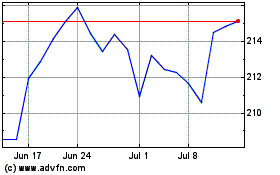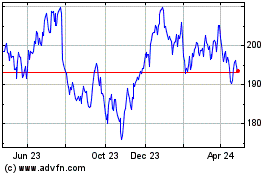Honeywell Reveals Surprise Shortfall -- WSJ
October 08 2016 - 3:02AM
Dow Jones News
By Ted Mann
Honeywell International Inc. said an unexpectedly weak September
prompted its forecast for lower annual sales, which spooked
investors in the aerospace-and-building systems conglomerate.
Chief Executive Dave Cote told investors Friday morning that
sales in areas such as aftermarket services for business-jet
engines and hand-held scanners for shippers and logistics companies
"failed to materialize" in the third quarter, requiring the company
to cut its targets for earnings and annual sales.
"We expected short-cycle orders that normally materialize," Mr.
Cote said. "They usually do, but in this case, they didn't."
Honeywell shares fell 7.5% Friday, pressuring shares of other
industrial players, including General Electric Co. and United
Technologies Corp.
The announcement, issued late Thursday, was "uncomfortable," Mr.
Cote said on a conference call. But the company remains confident
in its direction for the long term, he said, and executives say
they have weathered some of the headwinds, including weakness in
its business linked to oil refining and chemicals.
"This is the bottom" for Honeywell businesses exposed to the oil
and gas industries, Mr. Cote said, even as he cautioned troubles in
the business-jet industry "will get worse" next year.
Sales related to business jets were hurt by a variety of
factors, executives said, including slowing growth in emerging
regions including the Middle East, Russia and China. Chief
Financial Officer Tom Szlosek said an anticorruption campaign in
China has blunted the market for luxury goods such as private
aircraft.
Honeywell's announcement came amid other changes it reported
ahead of its third-quarter earnings release, scheduled for Oct. 21,
including a reorganization of a business unit and the integration
of an acquisition that sells automation systems to warehouse
operators.
Morgan Stanley analyst Nigel Coe, who derisively compared
Honeywell's announcement to a "paella bowl" dropped in front of
investors, said "credibility is becoming a growing issue." In a
research report, he asked: "Can we be sure that the wound has been
cauterized?"
The Morris Plains, N.J.-based conglomerate now says its
so-called core sales, which exclude acquisitions or divestitures,
will likely fall 3% in the third quarter and between 1% and 2% for
the year. The company lowered the upper end of its 2016 adjusted
earnings target by six cents to $6.64 a share.
In addition to the business-jet weakness weighing on
third-quarter results, ales, Honeywell is taking a $140 million
charge for sales incentives that will get the company's aerospace
systems included on new aircraft.
Those incentives to lock in business are "painful to do," Mr.
Cote said. "You take a short-term hit for it, but I really think it
sets you up for a long time to come."
Honeywell has been a Wall Street darling over the last
half-decade, seeming to perfect a strategy of small- to midsize
acquisitions. The company prides itself on integration and has
earned the right -- in the view of many bullish analysts -- to
function as a throwback conglomerate, with product offerings that
range from jet engines to chemical catalysts for oil refining to
thermostats and rubber boots.
The steadiness of that model, along with a strong record for
meeting and beating Wall Street expectations, is key to the legacy
of Mr. Cote, who is scheduled to retire as CEO in March. Mr. Cote
will be succeeded by Darius Adamczyk, who joined the company in
2008. Mr. Cote is to stay on as executive chairman through
2018.
Mr. Adamczyk didn't appear on Friday's conference call. In
response to an analyst's question, Mr. Cote said Mr. Adamczyk had
been "fully involved" and the corporate strategy in place when he
takes over would be "consistent with what we're saying today."
Mr. Cote's final months have included some moves that struck
observers as out of character, especially an unsuccessful $90
billion takeover bid for United Technologies, one of its chief
aerospace industry rivals. United Technologies rebuffed the bid,
saying neither customers nor regulators would allow it, and
Honeywell in March said it was walking away from the bid.
Honeywell's 7.5% decline Friday to $106.94 was the stock's
biggest one-day drop since Aug. 10, 2011, when it fell 7.6%.
Still, some analysts expressed confidence in the company's
long-term trajectory. The lowered forecast announced Thursday seems
bad compared with Honeywell's recent performance but is "not
catastrophic," JP Morgan analyst Stephen Tusa wrote in a note to
investors. Honeywell's profits are off about 5% since the beginning
of the year, which is roughly in line with its industrial peers, he
said.
Write to Ted Mann at ted.mann@wsj.com
(END) Dow Jones Newswires
October 08, 2016 02:47 ET (06:47 GMT)
Copyright (c) 2016 Dow Jones & Company, Inc.
Honeywell (NASDAQ:HON)
Historical Stock Chart
From Aug 2024 to Sep 2024

Honeywell (NASDAQ:HON)
Historical Stock Chart
From Sep 2023 to Sep 2024
